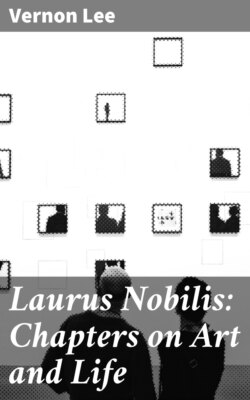Читать книгу Laurus Nobilis: Chapters on Art and Life - Vernon Lee - Страница 28
На сайте Литреса книга снята с продажи.
V.
ОглавлениеThe first of these reasons, the negative one, is that æsthetic pleasure is not in the least dependent upon the fact of personal ownership, and that it therefore affords an opportunity of leaving inactive, of beginning to atrophy by inactivity, the passion for exclusive possession, for individual advantage, which is at the bottom of all bad luxury, of all ostentation, and of nearly all rapacity. But before entering on this discussion I would beg my reader to call to mind that curious saying of Abbot Joachim's; and to consider that I wish to prove that, like his true monk, the true æsthete, who nowadays loves and praises creation much as the true monk did in former centuries, can really possess as sole personal possession only a musical instrument—to wit, his own well-strung and resonant soul. Having said this, we will proceed to the question of Luxury, by which I mean the possession of such things as minister only to weakness and vanity, of such things as we cannot reasonably hope that all men may some day equally possess.
When we are young—and most of us remain mere withered children, never attaining maturity, in similar matters—we are usually attracted by luxury and luxurious living. We are possessed by that youthful instinct of union, fusion, marriage, so to speak, with what our soul desires; we hanker after close contact and complete possession; and we fancy, in our inexperience, that luxury, the accumulation of valuables, the appropriation of opportunities, the fact of rejecting from our life all that is not costly, brilliant, and dainty, implies such fusion of our soul with beauty.
But, as we reach maturity, we find that this is all delusion. We learn, from the experience of occasions when our soul has truly possessed the beautiful, or been possessed by it, that if such union with the harmony of outer things is rare, perhaps impossible, among squalor and weariness, it is difficult and anomalous in the condition which we entitle luxury.
We learn that our assimilation of beauty, and that momentary renewal of our soul which it effects, rarely arises from our own ownership; but comes, taking us by surprise, in presence of hills, streams, memories of pictures, poets' words, and strains of music, which are not, and cannot be, our property. The essential character of beauty is its being a relation between ourselves and certain objects. The emotion to which we attach its name is produced, motived by something outside us, pictures, music, landscape, or whatever it may be; but the emotion resides in us, and it is the emotion, and not merely its object, which we desire. Hence material possession has no æsthetic meaning. We possess a beautiful object with our soul; the possession thereof with our hands or our legal rights brings us no nearer the beauty. Ownership, in this sense, may empower us to destroy or hide the object and thus cheat others of the possession of its beauty, but does not help us to possess that beauty. It is with beauty as with that singer who answered Catherine II., "Your Majesty's policemen can make me scream, but they cannot make me sing;" and she might have added, for my parallel, "Your policemen, great Empress, even could they make me sing, would not be able to make you hear."
